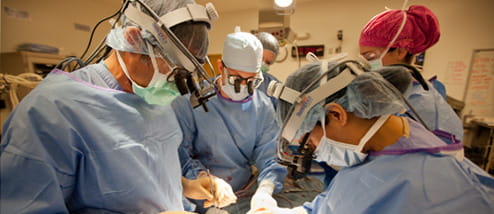Heart Failure and Recovery Program
Based on how severe your child's heart failure, doctors often manage pediatric heart failure with:
- Drugs
- Procedural treatments
- Surgery, which could include heart transplant
At the Heart Institute at UPMC Children's Hospital of Pittsburgh, we offer the full range of heart failure treatments.

Heart Failure Treatment Tailored to Your Child's Needs
At Children's, our heart failure experts take a team approach to treating your child's disease and strive toward recovery.
Treatment always starts with a full assessment of your child. This often includes different types of testing to learn the nature and extent of the heart failure.
A key tool in diagnosing heart failure is advanced cardiac MRI. This scan gives doctors detailed images of the heart and how well it's functioning.
Once we know the extent of the disease, we tailor the level of care based on your child's unique needs.
Heart failure treatments for your child may include:
Cardiothoracic (CT) surgery and heart transplant
Sometimes the only solution for heart failure in children is a heart transplant or other surgery.
The Heart Institute at Children’s Hospital is among the top pediatric CT surgery programs in the country.
In the most recent data analysis from the Society of Thoracic Surgeons conducted from July 1, 2016 through June 30, 2020, UPMC Children’s overall non-risk adjusted mortality rate was 1.82%, compared to the overall mortality rate for all other North American institutions participating in the STS analysis standing at 2.67%.
Medicine for heart failure
Along with diet and exercise, there are many drugs to help kids with heart failure that control:
- Heart rhythm
- Heart contraction
- Blood pressure
Catheter-based heart failure treatments
Children’s advanced heart cath lab conducts more than 750 procedures each year, including more than 150 minimally invasive cath-based treatments such as:
- Balloon valvuloplasties
- Balloon angioplasties
- Placement of intravascular stents
- Coil embolization
- Closure of holes in the heart
- Radiofrequency perforation of blocked heart valves
Mechanical circulatory support for pediatric heart failure
Extracorporeal membrane oxygenation, or ECMO, is the use of a modified heart-lung machine that provides air exchange. It offers prolonged support for people with severe but possibly reversible heart or lung failure.
The Heart Institute at Children’s Hospital is also a national leader in the use of ventricular assist devices (VADs). VADs can take over the pumping action of the heart, giving lifesaving support before a heart transplant.
With increasing frequency, Children’s is finding that VADs can often provide relief for the heart. In fact, it can allow the heart to recover fully and not need heart surgery.
Heart rhythm management
At Children’s Heart Arrhythmia and Rhythm Disturbances program, we sometimes use pacemakers to treat heart failure issues involving irregular rhythm.
Other cases may involve an electrophysiology study, leading to ablation of the conductive pathways creating extra rapid heartbeats.
Contact Children's Hospital About Heart Failure Treatment
Contact the Heart Failure Program at UPMC Children's Hospital of Pittsburgh at 412-692-5540 to learn more about our treatments. We also offer consults and second opinions.









